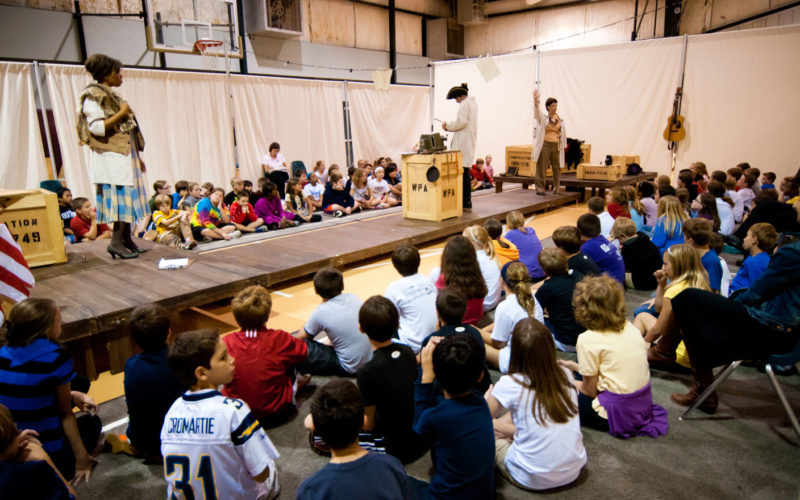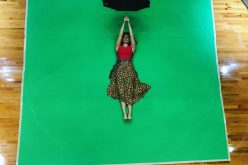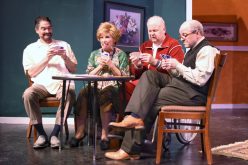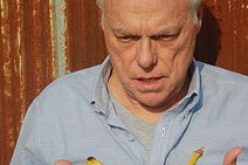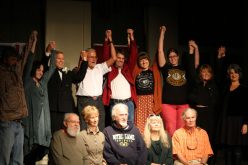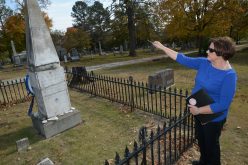Study supports value of arts integration in learning
JOCELYN MURPHY
jmurphy@nwadg.com
“The arts make us more human, make us more compassionate, make us more thoughtful and make us more reflective. And those are the things I want in my community,” asserts Laura Goodwin, vice president of learning and engagement at the Walton Arts Center in Fayetteville.
So what about the arts’ effects on education? Can the arts also make us smarter, strengthen our memory skills and establish a foundation for lifelong learning?
As arts enthusiasts and supporters, the staff at the Walton Arts Center certainly have always believed so. But a scarcity of quantitative evidence can make these theories difficult to back up.

Children participate during an interactive performance of “Digging Up Arkansas,” a stage show integrating real Arkansas history.
(Courtesy Photo/Stephen Ironside & Ironside Photography)
“Increasingly, we’re in a data-driven, empirical landscape when it comes to education,” offers Brian Kisida, who conducts education policy research. “One of the things I’ve noticed in terms of arts education research is that there’s really not enough of it out there. So a lot of times when advocates are trying to make the case for something and argue why it’s essential for a well-rounded education, it’s helpful to have some quality evidence.”
That quality evidence has arrived with the results of a yearlong study conducted among the Walton Arts Center, Kisida and Texas A&M University professor Daniel H. Bowen that were published Feb. 1. Between 2013 and 2014, the researchers conducted an experimental evaluation of the WAC’s educational program “Digging Up Arkansas” to assess how experiencing live performance impacts learning.
“I was pleasantly surprised that we found positive impacts on really the full range of things that we were looking at,” shares Kisida, who was with the University of Arkansas at the time. “I mean, you don’t go into a study hoping to find nothing, but we want to contribute to the body of knowledge that informs these things.”
“Digging Up Arkansas” is an original play written by Fayetteville playwright Mike Thomas that integrates Arkansas history with on-stage storytelling. The goal was to bring Arkansas history to life in the educational program in a fun and relatable way for elementary school children.
Thomas and director Kassie Misiewicz — artistic director at Trike Theatre — looked to the state curriculum standards in Arkansas history for third through fifth grades for the source material and integrated content students were expected to know into the play. The result is an interactive theater experience where children are invited into the tent of three Works Progress Administration writers in the 1930s. The WPA workers are trying to organize artifacts and stories ahead of President Roosevelt’s visit to the state in celebration of Arkansas’ 100th anniversary.
In evaluating the efficacy of the program, the researchers determined that students who saw the play demonstrated increased historical content knowledge, greater enthusiasm for learning about history, more historical empathy and more interest in the performing arts compared to the control group.

“In the academic literature, it’s an important piece of a growing body of evidence that’s discovering the important benefits of arts education,” says Brian Kisida, one of the researchers on a recently released study on the effects of arts integration on learning. “We’re finding that [arts education is] increasing student engagement, it’s increasing students’ tolerance levels, it’s increasing their compassion, it’s reducing disciplinary infractions. And those are all findings that are coming from well executed, rigorous research. Together, these make for important currency in education policy debates when decision makers are determining where to allocate resources and where to focus their efforts.”
(Courtesy Photo/Stephen Ironside & Ironside Photography)
In his development of the study, Kisida felt it was important he never read the script or saw the play. This enabled him to devise unbiased questions to gauge students’ learning after seeing the performance because the analysis questions were based only on the state standards and not the content presented in the show.
The attitudinal questions posed to the students after participating in “Digging Up Arkansas” further revealed information that is important to educational policy makers, Kisida shares. In cultivating a measurable enthusiasm for learning history, students are able to remember and recite more sophisticated details of the content, rather than only being able to “robotically recite back information,” Kisida says.
“Arts education has struggled a little bit over the last decade or two in terms of having a sure footing in the educational landscape,” he discloses. “And this speaks to this idea of how the arts — while we think they have fundamental and essential value in themselves — can also be great vehicles for delivering instruction in creative and innovative ways that can reach more students, and engage students, in ways that might not happen with traditional classroom settings.”
“One of my favorite student quotes from the whole history of ‘Digging Up Arkansas,’” Goodwin shares, “was, ‘Arkansas history is more interesting than you think it is.’ I just think that speaks to the power of theater to make those stories interesting, engaging and relevant. [For a] kid, learning through theater does give you a certain insight into what this information means to you.”
The WAC does not host “Digging Up Arkansas” as part of its programming every year, but since the play’s inception in 2010, nearly 70,000 students, representing every county in Arkansas, have experienced the show.
“Digging Up Arkansas” is part of the WAC’s arts and education outreach programming, which serves some 28,000 students and teachers every year through the Colgate Classroom Series. This type of outreach is made possible through the venue’s nonprofit status, and by funds raised throughout the year to support one of the WAC’s primary goals of community and youth engagement. More than $330,000 was raised in 2019 alone.
“To have a study like this that lets Walton Arts Center advocate in a way that’s supportive, not just anecdotal or just ‘This is what I feel in my gut’ is important,” Goodwin enthuses. “So, as I’m advocating with lawmakers, with superintendents, with policymakers, it’s a really good support for that kind of work.”
__
Go Online!
Read The Study
You can read the study by visiting journals.sagepub.com and searching “Teaching History Through Theater.”
Support WAC
Support arts education programming like “Digging Up Arkansas” and other efforts through the Walton Arts Center’s website at waltonartscenter.org.

